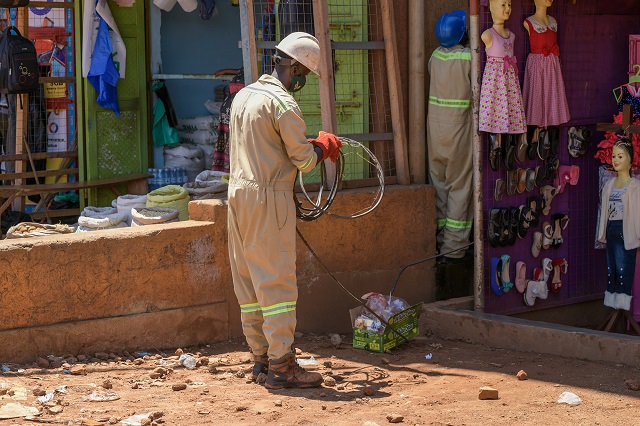
Why the refusal to renew their concession is not a big loss to Ugandan workers and investors and a boom to foreigners
THE LAST WORD | ANDREW M. MWENDA | For some strange reason(s), President Yoweri Museveni has a very hostile attitude towards Umeme, Uganda’s main electricity distributor. Sources say the president has sworn never to renew their concession when it expires in 2025. This is in spite of the fact that during negotiations between him and Umeme, both sides agreed to solve the most contentious issue in the concession – the Rate of Return (ROR) to the investor. In the current concession, Umeme’s ROR is 20%. In the meeting with Museveni, I am reliably informed, Umeme agreed to cut it down to 10%.
There is a rumour that a Chinese or Turkish investor has promised to take over the concession at a ROR of 7%. I find it difficult to believe the genuineness of this investor, if this claim is true. This is because Uganda government is selling its long-term bond (10 years) at 15% rate of interest. Even though the Umeme ROR is in U.S. dollars, even at 15% interest in Uganda shillings (if one calculates the long-term depreciation of our currency) such a ROR would be better than a $7% in U.S. dollars. Therefore, the president is either misinformed or has other reasons.
However, his stance on Umeme has created great uncertainty. Umeme is a publicly listed company on Uganda’s fledging stock exchange. When it launched its Initial Public Offering (IPO), the price per share was Shs240. At its height, the share of Umeme reached Shs560. When the president began his threats to Umeme, investors got scared. Since then, the price per share of Umeme has fallen to Shs250. This represents a drop of more than 50%. Rarely has a well performing company financially without internal management or business crisis witnessed such a sharp drop in its share-price.
The point is that Umeme is owned 23% by Ugandan workers through the National Social Security Fund (NSSF). Ordinary Ugandan investors own another 13% – making 36% of the shares in Umeme nationally owned. East Africans combined own 56% of the shares of Umeme. In a country where multinational capital owns all the commanding heights of the economy – finance, telecommunications etc., it is a source of pride that Umeme is the only large company in Uganda with a strong national ownership. Hence the fall in the share price of Umeme as a result of the President’s reckless statements is a huge loss to Ugandan workers and investors. NSSF alone (read Ugandan workers) has lost a huge percentage in its share value.
Local ownership also means that even when the investor is guaranteed a high rate of return, the beneficiaries are citizens who consume and/or invest their proceeds back in the country. If government pays its own citizens, especially a multitude of workers, high sums of money, the country loses nothing. It is like a husband hiring his wife in the family business. However high the wage she is paid comes back to the family’s coffers.
It is, therefore, intriguing that Museveni is hostile to a company a significant share of whose stock is held by Ugandans while silent on all other companies who are 100% owned by foreigners and whose rate or return is more than 20%. Some of these companies have made huge profits and shipped them abroad, yet it is difficult to find any substantial value they have brought into the country that without them the difference would have substantial. In the mid-2000s MTN had a rate of return above 50%.
Museveni’s fixation on Umeme is mostly misguided even though he had a strong point on the ROR at 20% for donkey’s years. Uganda’s negotiators should have de-risked the investment after the first five years and even de-risked it more after the IPO and the Second Public Offering (SPO). Of course, it could also be the case that an attractive ROR is the one that made Umeme’s IPO and later its SPO attractive to investors. This, one may argue, brought huge sums of money into the company as equity to invest in expanding and improving the network that has many technical problems.
Museveni’s main complaint against Umeme is that the company’s ROR has made the electricity tariff very expensive. This can only be partly true because Umeme’s contribution to the tariff ranges between 27-33%. The biggest contributor to the tariff is generation which represents 70% of the tariff, with transmission taking only 5%. If Uganda needs to reduce the tariff, it should focus on when it is giving concessions to generate electricity. But given the high cost of building dams, the electricity tariff in Uganda is a matter of the ideology driving energy policy.
In 2015, the World Bank published a study of electricity dynamics in 39 African countries. Only Uganda’s electricity tariff covered both capital and operational expenses and made a profit. Second to Uganda was Seychelles, which broke-even: the tariff paid for both the capital and operational expenses and left no profit. In the rest of the continent, countries could not recover the cost of capital and operational expenses through the tariff. So, they all depended on government to subsidise electricity. At the time, I celebrated Uganda’s position because I don’t like subsidies. But on deeper reflection, I have had to change my mind, recognising that my free-market beliefs do not fit Uganda’s case, especially our ambitions to industrialise and to reduce reliance on fire-wood.
Uganda’s energy policy is based on the ideology of the free market – the belief that electricity is like any other good sold in the market; so, the price charged should therefore reflect the cost of capital investment and operating expenses and then make a profit for the investor. An alternative vision would say that electricity is a public good like a road or security and serves other public purposes. For instance, we need an affordable tariff to stimulate industrialisation (making manufactured goods competitive in international markets) and to protect the environment (since reliance on firewood for cooking is accelerating deforestation).
Under this second vision, government can set the tariff below the cost of producing, transmitting and distributing electricity and use a subsidy to pay the balance. This is what is happening in most of Africa. Uganda does not need to subsidise domestic consumption of electricity. This is because the poorest Ugandans have already shifted to solar for lighting. The country needs to think of affordable alternative sources of energy for cooking away from charcoal and fire wood. Our country needs a very low tariff for manufacturers.
****
 The Independent Uganda: You get the Truth we Pay the Price
The Independent Uganda: You get the Truth we Pay the Price



Alertness and not a mistake is another way of seeing it. There are other ways government can influence the citizenry or consumers to utilize electricity profitably. One such way is to regularize tapping, utility and positive externalities. Thanks for sharing your thoughts.
The Umeme deal is a bad deal. viewed from whichever perspective the industrial sector gives a better testimony by its growth figures .my only problem is that in most situations, the president will always choose the wrong advice and you take the day Umeme is here to stay.
Thank you
1,Once a Ugandan learns how to manage business then better be worried, Ugandans have worked with first class investors and this has improved their innovation skills so they can confidently now manage Banks,Laws firms and businesses that require vocational skills.
2.Electricity business has always been the monopoly of Governments because of the expensive cost of capital that is required for construction of Dams.
3. In the early 2000s;Uganda had only one functional power dam so the government negotiating team did not have the capacity and courage to ask tough questions during the signing of contracts since they were in a fix.
4.Most Ugandans are happily paying electricity using Yaka because it forces them to use power with caution and it easy for government to note the amount of power consumed unlike in the past where bills were estimated which resulted in fraud and loss of revenue to Government this time revenue collection is easy.
5.In the business word its natural to form a rival business once you have gained experience from a successful company .Ugandans have gained experience from UMEME and they have realized that its YAKA is not rocket science its just about ICT.
6.Do you know why companies like Gulf Stream,Benz,Toyota dont share their manufacturing ingredients?Its because they know that a rival company can easily out compete them.
7,But how many Ugandans understand buying of shares in a company and how many buy shares when they are floated on the market?
8.Electricity for now should be taken a a raw material that drives production so it should not be expensive.
9.We used to hear of share prices drop in the USA stock Exchange market and Asia just by utterances made by Trump now it has come to Uganda which i think its a warning to other quack investors that Uganda has a President who is alert and thorough.This actually made me cry we now have problems like those of the first World.